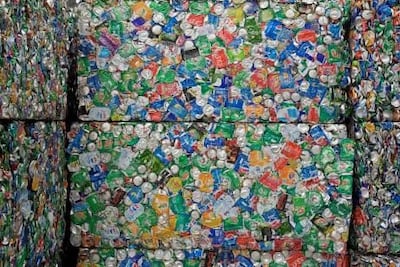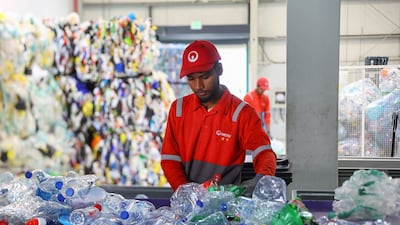Removing plastic from the environment has become an increasingly challenging task. Globally, only 9 per cent of plastic waste is recycled while 22 per cent is mismanaged every year, according to a report by the Organisation for Economic Co-operation and Development (OECD).
The accumulation of plastic waste in landfills and oceans is causing severe environmental problems, including harm to wildlife and ecosystems. It is crucial to find innovative solutions to reduce plastic production and increase recycling rates.
Over the years, several South-east Asian countries have stopped purchasing plastic waste. When China stopped buying the world’s discarded plastics in 2017, it threw markets into turmoil. With volumes increasing every year, this decision forced the global recycling industry to rethink its organisation and find new outlets for plastic waste. Although China's decision in particular was initially regarded as a challenge, it was also a great opportunity for the recycling sector in other countries such as the UAE.

The Emirates is in a prime position to become a global recycling hub, and measures are being systematically implemented to achieve this objective. It has taken the lead in creating a framework for Single Use Plastic Policy and implemented a ban on non-biodegradable plastic products.
Recognising the need for disruptive solutions, the UAE government has been supportive in nurturing the launch of the first Plastic Recycling Exchange – an Emirati export to the world. Abu Dhabi has established the Centre for Waste Management to control and co-ordinate all activities related to sustainable waste management. Sharjah, on the other hand, is working towards 100 per cent landfill diversion targets set for the emirate.
As we approach Cop28, the UAE’s plastics recycling sector has been developing dynamically. A recycling plant that can handle 12,000 tonnes of polyethylene terephthalate (PET) a year has been earmarked for Abu Dhabi. In line with the UAE’s efforts to reduce plastic pollution and boost trade through the export of recycled materials, the plant will recycle PET, a plastic material that is used in food packaging, such as plastic water bottles. The 40,000 square metre facility in Abu Dhabi could create 100 jobs and avoid the emission of 18,000 metric tonnes of carbon dioxide annually when at full operating capacity.
The development is in line with the Ministry of Industry and Advanced Technology’s recent decree regulating the trade of recycled plastic water bottles. It aims to encourage the manufacturing of water bottles using recycled plastic in line with top public health and food safety standards. This is projected to reduce and avoid 50,000 metric tonnes of carbon dioxide emissions, enhance the national in-country value by Dh150 million ($40.8 million) annually, and create more than 1,000 jobs.
Thanks to investments and a favourable regulatory environment, the UAE is on its way to become a hub for plastic recycling by taking advantage of both China’s decision and the government’s support of a range of initiatives including recycling technologies, and improving the waste management infrastructure.
With its strategic location, advanced infrastructure, and commitment to sustainability, the UAE is attracting investments from international recycling companies and positioning itself as a leader in the circular economy. To move forward, the plastic recycling industry must be scaled up even further on all fronts to achieve a circular economy for plastics in the Emirates.
First, collection and sorting technologies play an important role in ensuring increased efficiency and performance of a properly functioning waste-management system. Although the advancements in recycling and sorting technologies have greatly improved in the past years, more investments, as well as research and development, are needed to continuously enhance the quality of recycled material.
Second, we must develop a collaborative mindset towards plastic recycling to create a strong environment for green financing. The OECD had said that “trade can provide potential opportunities towards a global circular economy by channelling waste and materials to destinations where there is comparative advantage in sorting and processing these materials”.
Rebound Plastic Exchange allows buyers and sellers to efficiently trade plastic with trust and confidence, while increasing the efficiency of recycling plastic at scale. Ultimately, this delivers positive economic impacts to the recycling industry, and helps reduce the impact of plastic pollution on our planet.
The UAE’s sustainability targets can be met only if we reach beyond the low-hanging fruit. Individuals and consumer behaviour form the foundation of an entire ecosystem. Hence, working towards an advanced plastic recycling ecosystem is a must. A stronger circular economy depends on the successful separation of materials at the point of production. Given that the output is used across industries, mechanical and advanced recycling technologies are complementary and essential.
The UAE is renowned for capacity building and cutting-edge technologies. Now, its industry must re-evaluate its model by accelerating innovations to satisfy the increasing market demand for recycled plastics. The real transformation can be achieved by working collaboratively with all stakeholders and creating a regulatory framework that will foster conditions for sustainable and fully circular plastics recycling.
With data as the basis for all decision-making, Rebound Plastic Exchange has a key role to play while contributing significantly to the UAE's efforts towards sustainable development and helping it establish itself as a key player in the region's circular economy.


